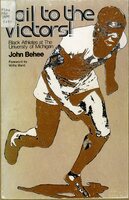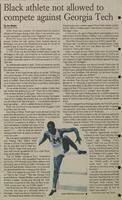The Michigan Daily and Academia
Tackling Ward in Academia
The first academic treatment of the Georgia Tech affair came in John Behee’s 1970 University of Michigan dissertation, “Fielding H. Yost’s Legacy to the University of Michigan.” The study focused on Yost’s work building the U-M athletic program and physical plant, but also examined his attitudes on race and the Georgia Tech affair. Behee's dissertation was revised and published in 1971.
Behee returned to the topic of race and athletics in his 1974 book, Hail to the Victors! Black Athletes at the University of Michigan. The Georgia Tech game was one of the featured stories in the volume, and Ward contributed a foreward. Based in part on interviews with Ward and two dozen other athletes, it was a pioneering study of race and college athletics.
Tyran Kai Steward’s 2009 master's thesis, “Jim Crow in the Big House: The Benching of Willis Ward and the Rise of Segregation in the North,” focused closely on the Georgia Tech affair and argued that Jim Crow was not a phenomenon of the South alone. In his 2013 dissertation, “In the Shadow Jim Crow: The Benching and Betrayal of Willis Ward,” Steward took a much broader look at Ward’s life and experience as an athlete and student at Michigan, as well as his post-Michigan career. It is the most extensively researched treatment of Ward and the Georgia Tech affair. In 2016, Steward published “‘At the University but Not of the University’: The Benching of Willis Ward and the Rise of Northern Racial Liberalism” in the journal American Studies.
In a more popular vein, sportswriter John U. Bacon's chapter on Fielding Yost in A Legacy of Champions: The Story of the Men Who Built Michigan Football assesses Yost's accomplishments as coach and athletic director, and critically examines his views on race and his actions in the Willis Ward controversy.
The Michigan Daily
Years after his graduation, Ward would get an occasional mention in The Michigan Daily: in a 1939 story on African American track star Bill Watson, who inherited Ward’s title as “the one-man track team” and was awarded the captaincy Ward never got; in a 1942 article about Julius Franks, the next African American football letterman, who got the All-American honor Ward had been projected to win in 1934; or periodically when someone bettered one of his hurdles or high-jump records.
Ward got a passing reference in a 1947 letter to the Daily editor explaining why photos of African American stars Len Ford, Gene Derricotte, and Bob Mann had not been included in a display of football players in the window of Dascola’s barbershop in Ann Arbor. Discrimination had been alleged, but the omission proved to be innocent and Dan Dascola noted that Ward’s photo had been on display when he was on the team. In December 1953, the Daily ran a one-sentence item from the Associated Press noting that the “one-time football and track great at the University of Michigan” had been sworn in as an assistant U.S. attorney in Detroit.
The publication of John Behee’s books prompted reviews and commentary in The Michigan Daily that briefly brought Ward back to light. Sports editor Marc Feldman wrote a major story that was published on the 40th anniversary of the Georgia Tech game under the headline, “A blot on the Michigan past.”
In a wide-ranging 1974 interview, Michigan Athletic Director Don Canham—a former U-M high jumper and track coach who had become friends with both Ward and Jesse Owens—responded candidly to a question on how he would have handled the Georgia Tech game. “I’d like to think I would have cancelled the game. Sure. But you have to go back in that time span. Maybe I’d have been a prejudiced guy in those days too.” In a 1999 end-of-the-century Daily series titled “A century of ‘U,’" Ward and playwright Arthur Miller were two alumni featured in a section devoted to the 1930s.


